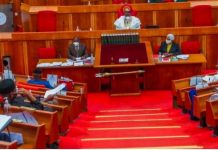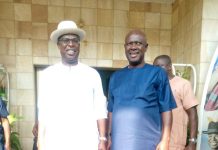By Emmanuel Oloniruha, News Agency of Nigeria (NAN)
The relationship between election and democracy is a fundamental aspect of a political system, while democracy remains the best form of government; election serves as a cornerstone of democratic governance.
Election does not just provide a mechanism for inclusive governance.
Credible election confers legitimacy on elected leaders and holds them accountable to citizens, credible election also promotes the rule of law, protect human rights, and foster political stability, which is a prerequisite for sustainable development.
Irrespective of the experiences, challenges and success stories, Nigeria’s elections are believed to be on progressive path.
From independence in 1960, Nigeria has continued to record significant milestones in its democratic journey with successful transition of power from the military rule to democratic government, and from one civil administration to another.
The country’s democratic journey is closely linked to the role of the Independent National Electoral Commission (INEC) in conducting free, fair and credible elections, and upholding democratic principles.
Commenting on INEC performance so far, Mr Ezenwa Nwagwu, the Chairman, Partners for Electoral Reform, a Civil Society Organisation (CSO) said that INEC has considerably contributed to the sustenance of Nigeria’s civil rule by striving hard to conduct credible elections, resulting in peaceful transition of power.
Nwagwu, a board member of Yiaga Africa, said that there is no way Nigeria can celebrate its 25 years uninterrupted civil rule without given due credit to INEC, the institution that midwives the leadership recruitment process.
He said that although INEC has its ups and downs “no one can take away the fact that Nigeria’s election has witnessed incremental progress.
“There was a point where we’re using Temporary Voters Cards (TVC), later some technologies such as the smart card reader, the Permanent Voters’ Card (TVCs) were introduced.
“We now moved to Bimodal Voter Accreditation system (BIVAS) and INEC Result Viewing Portal (IReV).
“All of those initiatives are to response of an institution that is conscious of its environment and the demand of the majority of Nigerians on the institution,’’ Nwagwu said.
He said that with INEC’s commitments, Nigeria has moved from where elections results were announced while voting was still in progress, to a level where elections are not only transparent, but consistently competitive, making the country a clear multiparty system.
“Today you now have about seven governors who lost their senatorial ambition and chairmen of a political party losing states to oppositions.
“People who ordinarily thought they would not even win and are today in the legislature. All this happened in 2023 general elections under Prof. Mahmood Yakubu,’’ he said.
Nwagwu attributed INEC’s progress to its consistent improvement in internal governance system, leadership, and self-cleanse ability, as well as continuous review of the Electoral Act and adherence to laws and guidelines.
“In spite of all the hue and cry that you see, whether in the judiciary court cases that has to do with elections, if you go and interrogate near 60 per cent of them have nothing to do with the conduct of elections.
“They have more to do with the misbehaviour or behaviour of the political class, their candidates and politicians. So, in terms of conduct of election, there is remarkable improvement,’’ he said.
Nwagwu also believes that with competitive elections, there would be no justification for military coup in Nigeria.
“For me there is even no excuse for military takeover of power in Nigeria, because whatever reason they may adduce will make no sense, because military rule is nothing better,’’ he said.
Mr Jide Ojo, a Political Scientist and Public Analysts, supported Nwagwu’s claim, saying that INEC has made invaluable contributions to the sustenance of the country’s democracy.
“Imagine what will have happen if there is no election in a democracy,’’ he said.
Ojo, a development consultant, also corroborated Nwagwu’s claim that elections in Nigeria are on progressive path, with now more competitive elections, especially under Yakubu,’’ he said.
He said that in spite the recent outcries; the percentage of the election outcomes upheld by courts decisions under Yakubu shows a progressive trajectory in the country’s elections.
He believes that even if some of the 2023 elections upheld are to be cancelled and rerun ordered by the courts, the outcome may not be too far from the initial outcome, because they substantially reflected the choice of the voters.
He listed continuous technology innovations, electoral reforms, prosecution of electoral offenders, and contributions of stakeholders as part of the factors that led to the successes by INEC.
But some Civil Society Organisations (CSOs) believe that INEC has not lived up to expectations especially in the conduct of credible poll in Nigeria, calling for the reform of the commission.
Speaking during the presentation of their report on the 2023 poll, the co-chair, Yiaga Africa Board, Dr Aisha Abdullahi, said the election was a fraud with logistics challenges adding that the delay in posting the election result in real time resulted in public distrust.
“Once again, the 2023 elections presidential and National Assembly (NASS) elections were a missed opportunity. Factors like serious logistical and technological shortcomings, non-compliance with electoral guidelines, lack of transparency, and manipulation of election results undermine public confidence in INEC and the overall outcome of the elections.
“Yiaga Africa notes that the integrity of electoral outcomes are influenced by processes and procedures. Therefore, a compromised process will produce questionable outcomes,” the report said while calling for the reform of INEC.
The CSO said INEC disregarded its efforts, adding that, “INEC must be fundamentally reformed. We will be reflecting on what happened. Let’s conclude the entire process, a comprehensive report will come out,” Aisha said, adding that the results announced by INEC fall within their confidence limit.
Also, the Centre for Democracy Development (CDD) called for the reform of INEC.
The director, CDD, Idayat Hassan, said this while appraising the 2023 general election.
But, the Chief Press Secretary to INEC Chairman, Mr Rotimi Oyekanmi, faulted the claim, saying that INEC has recorded tremendous improvements in managing Nigeria’s elections, attributing this to a number of factors including and commitment of the commission’s leadership.
He said that the continuous innovations introduced by INEC and cautious application of technology also help in ensuring smooth conduct of elections among others.
He, however, said that in spite the achievements, INEC challenges were multifaceted, including political class interference with the electoral process and its increasing involvement in the perpetration of electoral offences.
‘’Breaches of Memorandum of Understanding/Contracts by transport service providers; intimidation and harassment of regular and ad-hoc staff on election duty by disruptive elements;
“Also are issues around breaches of political party constitutions, laws and guidelines with impunity during primaries and congresses; endless litigations arising from political party matters in which INEC is joined.
“Endless fabrication of conspiracy theories, fake news by faceless groups and subjective elements around the conduct and of elections and election results,’’ he said.
For INEC to continue to play its crucial role in sustaining Nigeria democracy, Oyekanmi called for cooperation and active participation of Nigerians.
‘’Election is a multi-stakeholder activity; all Nigerians must take active part in ensuring that elections are conducted under a conducive as peaceful atmosphere,’’ he said.
He said that all stakeholders, including the political parties, CSOs, media, security agencies and voters, must be prepared to play their roles with sincerity, commitment and patriotism.
Oyekanmi said that while INEC has gone a long way in carrying out reforms, improving its processes and procedures, including spearheading the amendment of the Electoral Laws, culminating in the successful conduct of the 2023 General Election, all hands must be on deck for the country to attain the top quality electoral system.
“A virile electoral system is only possible when there is synergy, cooperation and understanding between INEC and critical stakeholders.
“For us at INEC, our commitment to free, fair, credible and inclusive elections is rock-solid and unwavering. We take our responsibility very seriously.
“We will not compromise standards even by an inch, in our determination to deliver on our mandate.
“No matter the circumstances, INEC will continue to ensure that only the individuals who genuinely win elections at the polling units in a free and fair process are declared winners at the end of such process,’’ he said.
The National Chairman of the Inter-party Advisory Council (IPAC), Mr Yusuf Dantalle, said that May 29 which marks one year of the Tinubu administration and 25 years of Nigeria uninterrupted democracy should be a reflection of how far the country has gone in deepening/strengthening its democracy.
Dantalle said that no doubt INEC has significantly contributed to sustenance of Nigeria’s democracy.
He urged all stakeholders including the security agencies and the judiciary, media and citizens to be decisive in protecting the nation’s democracy.
“Our hard earned democracy must be sustained. It should not be allowed to derail by the activities of anti-democratic and reactionary forces,’’ he said.
Dantalle called on politicians to abide by democratic ideals, ethics and ethos and desist from inflammatory utterances as well as actions that could impede constitutional government.
He tasked party leaders to live by example in ensuring an environment conducive for successful election, and more active citizens’ participations.
“Political parties must also adhere strictly by their constitutions in conducting congresses, primaries and conventions,’’ he added.





























